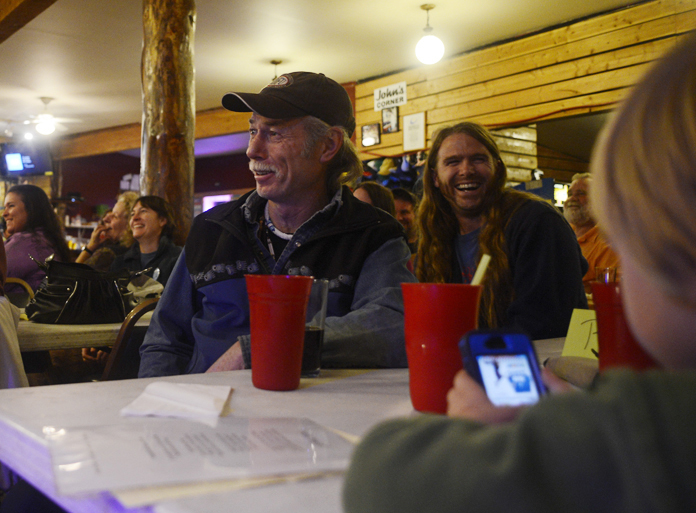The chords, familiar to many in the bar, drifted out over the audience who sat laughing and talking to each other. Several lifted glasses to drink as Richard King leaned into the microphone and crooned out the words to a classic Mexican song.
“Besame, Besame mucho. Como te ama (sic) esta noche la ultima vez,” he sang, his fingers expertly flicking his guitar strings as he grinned and leaned toward the audience.
Then, a twist that only a fisher poet could imagine.
“Kiss-a-me, Kiss-a-me sockeye,” he sang to the surprise and audible delight of the audience at the Tustumena Lodge on a Saturday night in late September.
“Your cold slime sends chills, all up my spine. Kiss-a-me, Kiss-a-me sockeye. When I possess you I’m feeling, unusually fine.”
His performance was greeted with laughter and applause to an audience of 40 who gathered at the lodge to hear a series of sea chanties performed by local fisher poets, including a poet from Homer, and aspiring audience members who competed for a $100 prize.
It’s the third year that fisher poets — mostly local folk so far — have gathered on the Kenai Peninsula to celebrate their common experiences as commercial fishermen.
The tradition, which began in Astoria, Ore., in 1998, brought poets, songwriters and even students of the commercial fishing industry to perform and educate the community on their particular brand of creative culture-sharing.
An evening performance the Friday before at the Kenai Visitors & Cultural Center — the original home venue for Kenai’s fisher poet gatherings — brought close to 50 people together to hear more than two hours of performances from former Kenai resident and well-traveled fisher poet Pat Dixon, local East Side setnetter Meezie Hermansen, Kasilof resident and Cordova drift fisherman Steve Schoonmaker and several others who shared their experiences and thoughts on fishing.
Laura Forbes, a volunteer for the event who has helped organize it in past years, said the fisher poet events started larger than originally anticipated in 2009 and have expanded since then.
Forbes worked for the visitors center when she organized the original event with Dixon. It was supposed to be a way to introduce tourists to the region and celebrate commercial fishing with residents, she said.
After the 2009 gathering, Forbes said she got a lot of background from Dixon — who is an organizer for the Fisher Poets Gathering in Astoria and travelling performer — about the history of fisher poets and the group of people who typically put the gatherings together.
In 2011 the Kenai gathering expanded into an open mic event, a panel and an invitation to fisher poets to visit for the weekend, Forbes said.
This year, a grant from the Alaska Arts and Culture Foundation helped bring Dixon, who lives in Washington, back to the area and covered other performance-related expenses, Forbes said.
The group did several public events and visited three local high schools.
Forbes said the performers reached about 160 youth and brought seven artists to the community for education and outreach.
Expanding into the schools and the Tustumena Lodge provided a different venue than one the poets held at the visitor center.
Forbes said the environment was less formal and therefore pushed the boundaries of creativity while Dixon called the open mic night at the Tustumena Lodge more indicative of a fisher poets gathering.
“(It’s) a little more rowdy and a little more bawdy and that was a surprisingly big crowd, too,” he said. “They seemed to have a ball.”
Homer resident Trina Uvaas stole the show Saturday by reading two bawdy poems including one, “50 Shades of Grayling,” that brought a cleverly crafted eroticism to the act of catching a fish and had the crowd roaring with laughter.
After reading it, Uvaas blushed furiously and assured the audience she was “not a weirdo,” just having a little fun.
Veteran poet Schoonmaker grinned and shouted from the audience “Are you married?” and, as she left the stage, Dixon dropped to his knees and bowed several times promising her a future husband if she would deign to leave the state and read at the Astoria gathering.
“Trina’s piece was a surprise and just a tremendous amount of fun,” he said.
Several poets used their performances to talk about politics or environmental issues in their respective fisheries.
“A lot of fisher poetry and songwriting deals with the politics in commercial fishing and all of the different battles we fight to protect the fishery,” Dixon said. “Sometimes it’s allocation, other times its environmental — like what’s going on with Chuitna or the Pebble Mine — I just heard this weekend that they want to dam the Susitna River. A lot of people write about things like that. The first fisher poem I ever wrote was about the Exxon Valdez oil spill and what it was doing to us.”
Others used their allotted time to reminisce about the joy — or boredom — associated with commercial fishing for a living.
Forbes said the collection of creative people who typically did not identify themselves as artists, but who displayed their respective gifts of gab over the weekend did not surprise her.
“Everybody has that instinct and I think this event is a really great way to bring that individuality or that expression out into the community,” she said. “It has been a challenging time for the fisheries in the central peninsula and across the state and a contentious time, depending on which user group you’re from. So, really, this is another great opportunity for a group of people who have this culture to come together and celebrate that culture rather than coming together for a protest or a potentially contentious meeting.”
Rashah McChesney is a reporter and photographer for the Peninsula Clarion.



